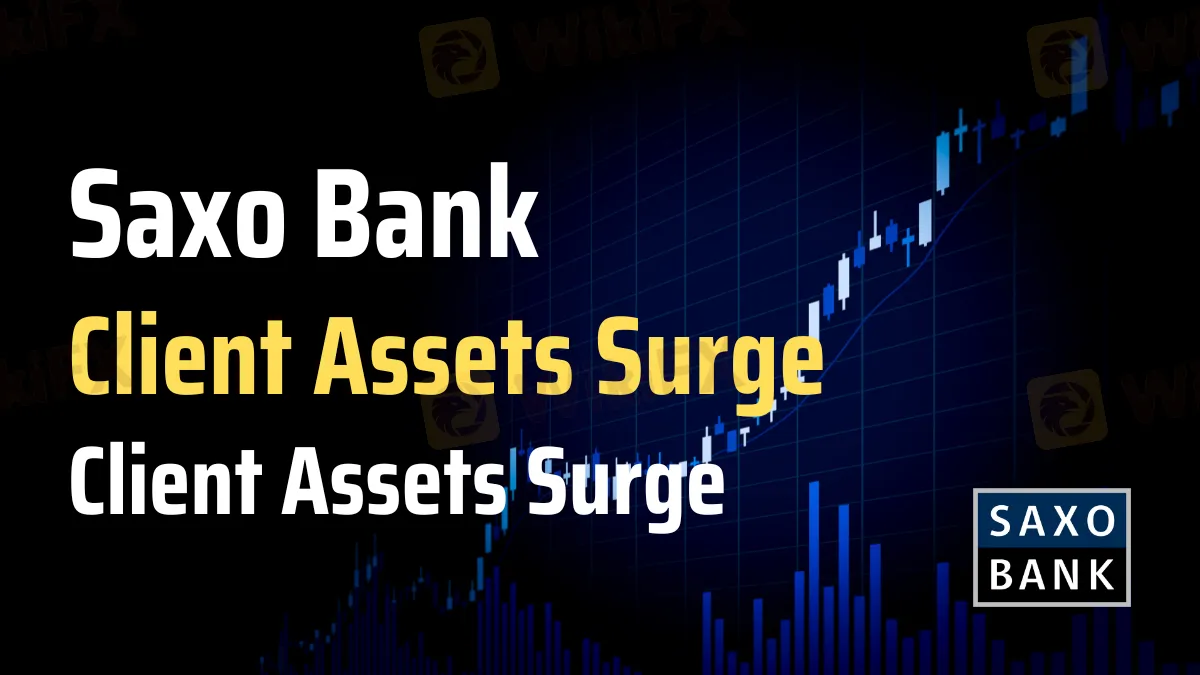简体中文
繁體中文
English
Pусский
日本語
ภาษาไทย
Tiếng Việt
Bahasa Indonesia
Español
हिन्दी
Filippiiniläinen
Français
Deutsch
Português
Türkçe
한국어
العربية
Saxo Bank Client Assets Surge to $116 Billion
Abstract:Saxo Bank's client assets hit a record $116 billion, marking significant growth and stability in challenging economic times.

Saxo Bank, headquartered in Copenhagen, has accomplished an extraordinary feat by amassing $116 billion (DKK 800 billion) in customer assets. This achievement highlights the financial institution's exceptional performance and substantial expansion within the fiercely competitive brokerage sector.
Since its inception more than thirty years ago, Saxo Bank has ascended steadily but gradually to financial prominence. At its inception, the firm accumulated client assets worth DKK 150 billion over 25 years. In contrast, Saxo Bank experienced a remarkable exhibition of expedited expansion over the subsequent six years, doubling its assets by a factor of five and adding a remarkable DKK 650 billion.
This accomplishment not only serves as evidence of Saxo Bank's sustained attractiveness in the financial markets but also underscores the effectiveness of its strategic business choices. The organization implemented a price reduction strategy at the start of the year, which resulted in a significant influx of new customers. In a milestone development, Saxo Bank currently maintains more than 1.2 million active accounts.

The clientele's confidence was crucial in achieving this milestone, as stated by Kim Fournais, CEO and founder of Saxo Bank. He extended his sincere appreciation to them. “Attracting a substantial number of new clients and assisting in their retention were two positive outcomes of reducing our prices at the beginning of the year.” Furthermore, our extensive array of offerings and products enables our clients to minimize the potential hazards linked to fluctuations in the market, Fournais added.
Client assets have expanded considerably in tandem with Saxo Bank's growing prominence in the financial sector. Last year, Saxo Bank obtained the Systemically Important Financial Institution (SIFI) classification from the Danish Financial Supervisory Authority. This distinction recognizes organizations that are critical to the financial system and whose collapse might cause widespread financial instability.
Being declared a “too big to fail” institution includes some complexities and requirements, including increased regulatory monitoring and the need for robust security measures. This classification emphasizes the bank's role in maintaining the system's financial stability.
The recent upgrade of Saxo Bank's long-term credit rating to 'A-' by S&P Global Ratings serves as additional validation of the bank's sound financial condition and operational robustness. This promotion signifies the bank's improved capacity to fulfill the rigorous criteria anticipated of a SIFI, as well as its fortified financial profile.
The bank also said that its average daily volume climbed across all asset classes in April 2024, hitting $21.9 billion from $18.1 billion the previous month. This is a significant increase. This demonstrates a high level of trading activity and client trust in Saxo Bank's interface.
Saxo Bank has cemented its position as a worldwide financial industry leader by recent victories that exhibit agility and strategic understanding.

Disclaimer:
The views in this article only represent the author's personal views, and do not constitute investment advice on this platform. This platform does not guarantee the accuracy, completeness and timeliness of the information in the article, and will not be liable for any loss caused by the use of or reliance on the information in the article.
Read more

SEC Ends Crypto.com Probe, No Action Taken by Regulator
The SEC has closed its investigation into Crypto.com with no action taken. Crypto.com celebrates regulatory clarity and renewed momentum for the crypto industry.

Bitpanda Secures Full Broker-Dealer License in Dubai
Bitpanda has officially obtained a full broker-dealer license from the Dubai Virtual Assets Regulatory Authority (VARA), marking a significant milestone in its international expansion. This approval, which follows preliminary authorization granted three months earlier, enables the European digital asset exchange to introduce its comprehensive suite of virtual asset services to investors in the United Arab Emirates (UAE).

Interactive Brokers Expands Crypto Trading with Solana, XRP, Cardano, and Dogecoin
Interactive Brokers adds Solana, XRP, Cardano, and Dogecoin to its platform, enabling U.S. and U.K. clients to trade crypto 24/7 with low fees.

Gold Surges to New Highs – Is It Time to Buy?
Recently, gold prices have once again set new records, surpassing $3,077 per ounce and continuing a four-week winning streak. Is It the Right Time to Invest?
WikiFX Broker
Latest News
How Crypto Trading Transforms FX and CFD Brokerage Industry
UK would not hesitate to retaliate against US tariffs - No 10 sources
Navigating the Intersection of Forex Markets, AI Technology, and Fintech
Exposed: Deceptive World of Fake Trading Gurus – Don’t Get Fooled!
The One Fear That’s Costing You More Than Just Profits
Currency Calculator







